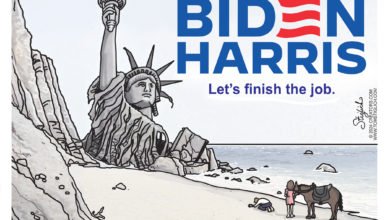Why ‘Travelin’ Soldier’ Is the Best Anti-War Song Ever Written—and Always Brings a Tear to My Eye
When the subject of great anti-war songs comes up, a few tunes immediately come to mind.
“Fortunate Son” by Creedence Clearwater Revival, “Gimme Shelter” by the Rolling Stones—’War, children. It’s just a shot away’—and Bob Dylan’s “Blowin’ in the Wind” are personal favorites. Some of my friends are partial to “War Pigs” by Black Sabbath.
Yet for me, one song blows them all away (pardon the expression). That song is “Travelin’ Soldier,” a song country music artist Bruce Robison wrote in 1996 that was later made famous by The Dixie Chicks (now just The Chicks).
For years I didn’t know what the song was about; nor that the song was written by Robison, a Texas-based singer-songwriter, and not by the Dixie Chicks, who in 2002 recorded the song and took it to #1 on Billboard’s country charts.
But eventually—I don’t even know when—I fell in love with not just the song, but every lyric in it.
‘Crying All Alone Under the Stands’
For those who don’t know the song or have never listened closely, “Travelin Soldier” describes a young American shipped off to war to fight in Vietnam. Before he leaves home, however, he meets a young girl in a cafe whom he falls for, and the song describes the letters they exchange as he fights in a conflict a world away that neither of them understand.
As the letters fly back and forth, we see the young couple has fallen in love. But happiness is not to be. In the song’s last lines before the chorus, emphasized in the full lyrics below, we learn the young soldier has been killed.
[Verse 1]
Two days past eighteen
He was waitin’ for the bus in his army greens
Sat down in a booth in a cafe there
Gave his order to a girl with a bow in her hair
[Verse 2]
He’s a little shy so she give him a smile
And he said, “Would you mind sittin’ down for a while
And talkin’ to me?
I’m feelin’ a little low”
She said “I’m off in an hour and I know where we can go”
[Verse 3]
So they went down and they sat on the pier
He said “I bet you got a boyfriend, but I don’t care I got no one, to send a letter to
Would you mind if I sent a-one back here to you?”
[Chorus]
I cried
Never gonna hold the hand of another guy
“Too young for him,” they told her
Waitin’ for the love of a travelin’ soldier
Our love will never end
Waitin’ for the soldier to come back again
Nevermore to be alone
When the letter said, “A soldier’s comin’ home”
[Verse 4]
So the letters came from an army camp In California then Vietnam And he told her of his heart, it might be love And all of the things he was so scared of
[Verse 5]
He said, “When it’s gettin’ kinda rough over here
I think of that day sittin’ down on the pier
And I close my eyes and see your pretty smile
Don’t worry but I won’t be able to write for a while”
[Chorus]
I cried
Never gonna hold the hand of another guy “Too young for him,” they told her
Waitin’ for the love of a travelin’ soldier
Our love will never end
Waitin’ for the soldier to come back again
Nevermore to be alone
When the letter said, “A soldier’s comin’ home”
[Verse 6]
One Friday night at a football game
The Lord’s Prayer said and the anthem sang
A man said, “Folks, would you bow your heads
For a list of local Vietnam dead?”
[Verse 7]
Cryin’ all alone under the stands
Was a piccolo player in the marchin’ band
And one name read, and nobody really cared
But a pretty little girl with a bow in her hair
[Chorus]
I cried
Never gonna hold the hand of another guy
“Too young for him,” they told her Waitin’ for the love of a travelin’ soldier
Our love will never end
Waitin’ for the soldier to come back again
Nevermore to be alone
When the letter said, “A soldier’s comin’…”
[Chorus]
I cried
Never gonna hold the hand of another guy
“Too young for him,” they told her
Waitin’ for the love of a travelin’ soldier
Our love will never end
Waitin’ for the soldier to come back again
Nevermore to be alone
When the letter said, “A soldier’s comin’ home”
A young man dying in war is always a tragedy, but there’s a poetry in these lyrics that adds something more.
Though older than the girl, the soldier is little more than a boy himself (“two days past eighteen”) and yet finds himself sent to the jungles of Vietnam. He’s not just frightened but alone, so alone he asks if he can write letters to the girl who showed him the kindness of a smile and a few words on the pier.
As the war gets rougher, it’s the love of this girl (or the idea of the girl) that he just met that sustains the soldier. He loves her, and we see she loved the soldier.
In the most beautiful stanza of the song, we see the girl mourning this shy boy whose name is among those killed in action. As the names are read off one by one at a local football game, she weeps for him alone beneath the bleachers. And unlike those who dutifully recited the Lord’s Prayer and National Anthem to honor those who died, we understand that she cared for the boy in a way they did not.
‘Violence in Concentrated Form’
The philosopher Hannah Arendt once observed the fundamental problem with violence.
“The practice of violence, like all action, changes the world,” she wrote, “but the most probable change is a more violent world.”
There are few—if any—greater expressions of violence than war. And though few people would describe themselves as proponents of war, it’s clear many in our world today have grown comfortable with violence if it achieves the ends they seek.
“The principle of violence finds widespread application all over the world, in America as elsewhere,” philosopher and FEE founder Leonard Read observed in his essay “Instead of Violence.”
When he speaks of violence, Read makes it clear he’s not just talking about dropping bombs or shooting people, but taking things from others without consent:
“Personally, I am opposed to the initiation of violence in any form, by any body, or by any agency, government or otherwise. I cannot make inspired Violence square with ethical concepts. Aggressive coercion, whether socialized medicine or initiating war with Russia, is at odds with principles which seem right. How this brute force can be used and be considered moral, except to restrain violence otherwise initiated, is beyond my capacities to reason.”
It’s an empirical fact that the twentieth century was the bloodiest century in human history, and I don’t believe it’s a coincidence that this distinction was achieved as humans around the world embraced violence in its most pure and efficient form: the state.
It was the twentieth century that witnessed a profound transformation: the completion of the shift away from the idea that government is a necessary evil, designed to protect the rights of individuals, to the idea that government is a force for good that can deliver mankind from poverty and evil.
Read was not the only person troubled by the growing acceptance of state-wielded violence.
Mahatma Gandhi was among those who were deeply troubled by this shift, no doubt largely because he understood the true nature of the state.
“The state represents violence in a concentrated and organized form,” Gandhi wrote in 1935. “The Individual has a soul, but as the state is a soulless machine, it can never be weaned from violence to which it owes its very existence.”
This is why Gandhi saw non-violence as the epitome of bravery, the true antidote to violence driven by “the machinery of government.”
It might sound strange, but I think of this when I listen to “Travelin’ Soldier.” I think of how comfortable Americans have grown with the use of violence at home, whether through property seizures, for instance, or the policing of peaceful activity; of how leaders in our nation’s capital project power around the world and fund conflicts between other nations.
It makes me think Hannah Arendt was right when she observed that violence tends to beget violence. And when I think of that 18-year-old shipped off to Vietnam, who was mourned only by a piccolo player in the marching band, I think of a line from Game of Thrones.
“Why is it always the innocents who suffer most, when you high lords play your game of thrones?” the counselor Varys asked.
It’s not the politicians who fund the wars who pay the ultimate price. Nor the citizens at home who dutifully support and often cheer for conflicts abroad. It’s people like the Soldier, and those who are left to mourn him.
And that’s why “Travelin’ Soldier” always brings a tear to my eye.
Content syndicated from Fee.org (FEE) under Creative Commons license.
Agree/Disagree with the author(s)? Let them know in the comments below and be heard by 10’s of thousands of CDN readers each day!





I object to your implicit premise – that the average citizen is a participant in this open-armed embrace of orgiastic violence. There are 2 actual drivers present. (1) Nondemocratic foreign leaders owe their positions to force or the credible threat of it. Thus the U.S. is faced with adversaries who will aggress until “persuaded” their aggression is bad for their long term health. (2) As odd as it may sound, the 17th Amendment, which took away the selection of Federal senators from State legislatures and gave it to the People. This would not be most people’s 1st choice as a source of violence, but bear with me. In so doing, the State governments lost their seat at the Federal table. Most people think of “checks and balances” as the 3 Federal branches opposing each other. But a major check was the Senate which simply declined to pass legislation it felt was detrimental to the States’ or the Nation’s interests. It served as a “check” by simply failing to act. All Federal mischief has followed the 1912 adoption of the 17th Amendment. The Federal government has grown ever larger doing more things, some well but most badly, and it tramples on people who are inconvenient. It now sets societal goals 10, 20 even 30 years out with no referendum by the People. The 1st Amendment has been interpreted to allow unlimited political cash to be spent on, or contiguous to, all Federal office elections. There is little seeming difference between the philosophies of London in 1776 and Washington in 2023. Congress has become a rug bazaar. To many Americans, our government has come to represent a “gun” hired to commit violence on the body politic on behalf of special interests. The first half of the current administration was spent arresting members of the prior administration. This violence is all being done TO the People, not BY the People. The courtiers in D.C. have perfected the self-licking ice cream cone – The cone most attracts the people who want to make it bigger solely for the reputation as the biggest pusher of ice cream.